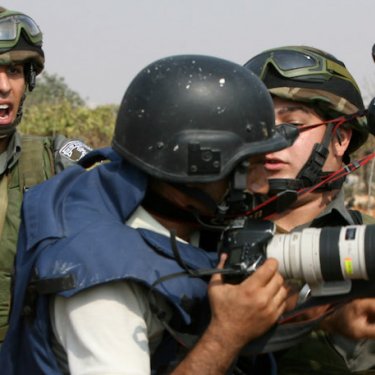Will filming Israeli soldiers soon be punishable by 10 years in prison?

Reporters Without Borders (RSF) calls on the Israeli parliament, the Knesset, to reject a bill that aims to criminalize filming or recording Israeli soldiers while on duty or publishing the resulting video or audio recordings on social networks or in the media. It would violate the right to inform, RSF says.
Under the bill, which the Knesset began considering yesterday, doing any of these things “in order to harm the morale of Israel’s soldiers or its inhabitants” would be punishable by five years in prison, or ten years if it was done with intent to “harm the security of the state.”
“On what basis would intent to harm Israeli morale or national security be determined?” RSF asked. “In a country in which much of the political class already accuses the media and NGOs of anti-patriotism or treason, isn’t there a danger that such a provision would prevent the dissemination of video footage simply because it wasn’t very flattering?”
RSF added: “We urge parliamentarians not to pass this bill, which would result in journalists settling for content provided by the Israeli army and for propaganda videos to avoid going to prison.”
Proposed several months ago by Yisrael Beitenu, a far-right party that is part of the ruling coalition, the bill would amend article 2 of the penal code on “treason” and, in particular, paragraph 103 on “defeatist propaganda.”
A government minister, Tzachi Hanegbi, acknowledged yesterday that the proposed amendment could obstruct freedom of expression and suggested that it should only apply to “obstruction of a soldier while on duty” and that the penalty should be limited to three years in prison.
To justify the bill, its authors point to the existence of groups “supported by associations, organizations and governments with clearly anti-Israeli outlooks and agendas” that spend “entire days near Israeli soldiers waiting with baited breath for some action they can document in a biased and one-sided way in order to defame the soldiers”.
The bill even names some of these groups, such as B’Tselem, MachsomWatch and Breaking the Silence, and refers to others that support the international “Boycott, Divestment and Sanctions” campaign.
In 2016, video footage recorded by a citizen-journalist using a camera provided by B’Tselem helped to prove that an Israeli soldier, Elor Azaria, shot a Palestinian attacker in the head as he lay wounded on the ground. In April of this year, when Israeli use of force against Gaza residents demonstrating near the border killed at least 132 people, two other videos of Israeli soldiers triggered further controversy in Israel.
The first showed an Israeli sniper shoot a Gazan. The defence minister said the soldier who fired the shot had behaved appropriately, but not those who had filmed it. In the other video, filmed by members of the left-wing Israeli group Boycott from Within, the group’s members are shown challenging Israeli soldiers near the Gaza border about their actions, asking: “Are your parents happy when you come back home after killing civilians? You have massacred 21 innocent civilians in the terror organization that you’re active in.”
The idea of restricting the freedom of expression of Israeli media regarded as hostile and posing a threat to their own country’s security is not new.
Criticizing Israel’s Social TV last September, the communication minister said: “Freedom of expression and the Basic Laws are good for the citizens of Israel who accept the law, respect the law and are concerned with the future and security of Israel. But when we talk about organizations that are looking to harm Israel's future and security we cannot be too innocent and naive and it is important to stop them.”
The spokesman of Breaking the Silence, described by the justice minister as “a liar who internationally defames the State of Israel," is meanwhile being prosecuted on an assault charge as a result of having said he beat a Palestinian while serving as a soldier in the West Bank. Breaking the Silence publishes video interviews with former soldiers.
Journalists and NGOs who know they are the targets of this bill show no sign of backing down. B’Tselem said: “If the government is embarrassed over the occupation, it should work to bring it to an end. In any case, visual footage of life under occupation will continue.” On 17 June, Israeli reporter and columnist Gideon Levy wrote in the newspaper Haaretz: “We will violate this law proudly (...) We will not stop documenting. We will not stop photographing. We will not stop writing.” He added that he hoped that Palestinian eyewitnesses would continue to do the same, even if they paid a greater price than Israelis.
In May, RSF asked the International Criminal Court to investigate the direct shots that Israeli army snipers had fired at some 20 Palestinian journalists during the “March of Return” protests in Gaza.
Israel is ranked 87th out of 180 countries in RSF's 2018 World Press Freedom Index.



